China’s Divestment of US Debt and Its Broader Implications
Over the last decade, China has steadily decreased its holdings of US Treasury securities, resulting in a 14-year low, based on the latest data from the U.S. Treasury Department.
According to an article by Jenry Kanapi for The Daily Hodl, China’s accumulation of US Treasuries peaked in May 2013, reaching an all-time high of $1.297 trillion. Since then, China has consistently divested its Treasury holdings, bringing it down to $778.1 billion as of September 2023, representing a significant decrease of over $518.9 billion from the 2013 peak.
The Geopolitical and Economic Implications
The reduction in Treasury holdings by China reflects broader geopolitical and economic shifts. It could be seen as a strategic repositioning by China in the global financial landscape.
Moody’s Revised U.S. Government Credit Rating
According to a report by CNBC, Moody’s Investor Services revised the U.S. government’s credit rating outlook from “stable” to “negative,” primarily due to increasing political polarization in Congress. Despite retaining its highest AAA credit rating from Moody’s, Fitch Rating and Standard & Poor’s have previously downgraded their ratings.
The Potential Impact
As CNBC points out, a change in the actual credit rating could limit the US government’s borrowing capacity or increase borrowing costs. This might impact the government’s ability to pay workers and provide essential services like Social Security. It could also affect the stock market, interest rates, and consumers’ access to loans.
Hot Take: The Future of US-China Financial Relations
The strategic divestment of US debt by China underscores the evolving dynamics of global financial power. This situation highlights the interconnectedness of global economies and the potential ramifications of geopolitical and economic decisions on the world stage.





 By
By
 By
By
 By
By
 By
By
 By
By